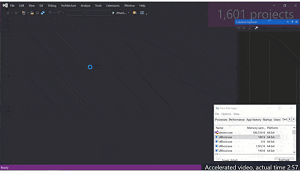News
Visual Studio 2022: Faster, Leaner and 64-bit (More Memory!)
Visual Studio 2022 will be previewed this summer as a 64-bit application, opening up gobs of new memory for programmers to use.
"Visual Studio 2022 will be a 64-bit application, no longer limited to ~4gb of memory in the main devenv.exe process," said Amanda Silver, a program management exec in the Developer Division in an April 19 blog post introducing VS 2022. "With a 64-bit Visual Studio on Windows, you can open, edit, run, and debug even the biggest and most complex solutions without running out of memory."
Visual Studio has long been available in a 64-bit edition able to create 64-bit applications on 64-bit computers, but it remained a 32-bit application itself. This caused confusion among some developers who downloaded the 64-bit version only to find it was installed as an x86 app. In reply to that issue posted on the Developer Community site in 2019, Microsoft responded: "Visual Studio remains a 32-bit application, though certain components (e.g., diagnostics/debuggers, MSBuild, compilers, designers) will take advantage of 64-bit processors if available. We've updated our download pages to clarify this." Now, long into the 64-bit computing era, that has finally changed.
To demonstrate the real-world effect of VS being a 64-bit application, Silver pointed to a GIF video showing the IDE open up a solution with some 1,600 projects and about 300,000 files:
 [Click on image for larger, animated GIF view.] VS 2022 Opening 1,600 Projects and 300k Files (source: Microsoft).
[Click on image for larger, animated GIF view.] VS 2022 Opening 1,600 Projects and 300k Files (source: Microsoft).
"Here's to no more out-of-memory exceptions 🎉" Silver concluded.
She also described the next major release of VS as faster, more approachable and more lightweight, with a UX described as cleaner, intelligent and action oriented, suitable for both learners and professional coding teams creating industrial-scale applications.
Of course, it will fully support .NET 6, set to debut in November as a unifying release that brings Xamarin, Blazor and other tooling into the mix, encompassing all part of the .NET development ecosystem, including web, client, mobile, gaming, IoT and AI apps. That means it will include new goodies such as Blazor and .NET MAUI (an evolution of Xamarin adding desktop support to allow for cross-platform client apps on Windows, Android, macOS and iOS). They can be used to create desktop apps. That makes for an almost dizzying array of desktop options.
The long-awaited Hot Reload (making code changes that are reflected instantly in a running app during debug) will also be available, along with updated icons and integration with Accessibility Insights to quickly address accessibility issues during development.
A host of other new features include:
- C++: Workloads will be supported with new productivity features, C++20 tooling and IntelliSense.
- Azure: Cloud-based app development will be boosted by repositories that describe common patterns used in modern apps.
- Debugging: Coming are performance improvements in the core debugger, with "features like flame charts in the profiler for better spotting the hot paths, dependent breakpoints for more precise debugging, and integrated decompilation experiences which will allow you to step through code you don't have locally."
- Live Share: Real-time collaboration is improved with integrated text chat fostering quick conversations about code without any context switches.
- IntelliCode: This AI-enhanced IntelliSense will provide better integration with daily workflows, anticipating what developers might want to do next in their coding so they "take the right action in the right place at the right time."
- New support for Git and GitHub: "You'll notice a lot of built-in logic and checkpoints to guide you efficiently through the merge and review process, anticipating feedback from your colleagues that could slow things down."
- Improved code search: Developers can search outside loaded scopes, helping them find results irregardless of what code base or repo they are in.
- Mac: The team is also working to bring the Mac IDE up to par with the Windows IDE, something that has been a thorny problem in terms of reliability and other issues, addressed by switching to Windows internals.
The first preview of VS 2022 will ship this summer, coming with the UI refinements and accessibility improvements. Other features under development may get added after the first public release.
"It's about damn time!" said one developer on Reddit.
A Hacker News reader expressed similar thoughts: "I guess the big news is the support for 64-bit. Good that it didn't take them that long - the first Windows version on a 64 bit architecture is not even 20 years old yet. Windows XP for IA-64 was released in October 2001."
About the Author
David Ramel is an editor and writer at Converge 360.